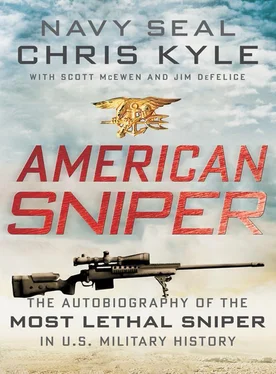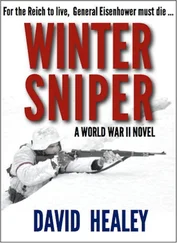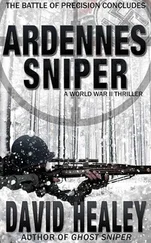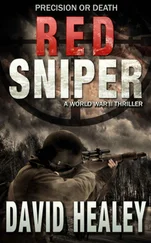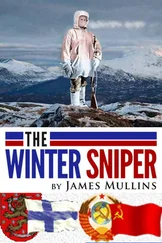We would take a house on the right side of the street, then cross to the left and take the house across the way. Back and forth, back and forth. All of this took a lot of time. We’d have to go around the gates, get to the doors, blow up the doors, rush in. The scum inside had plenty of time to get prepared. Not to mention the fact that even with what I’d contributed, we were running out of explosives.
A Marine armored vehicle was working with us, moving down the center of the street as we went. It only had a .50-cal for a weapon, but its real asset was its size. No Iraqi wall could stand up to it once it got a head of steam.
I went over to the commander.
“Look, here’s what I want you to do,” I told him. “We’re running out of explosives. Run through the wall in front of the house and put about five rounds of .50-cal through the front door. Then back up and we’ll take it from there.”
So we started doing it that way, saving explosives and moving much faster.
Pounding up and down the stairs, running to the roof, coming back down, hitting the next house—we got to where we were taking from fifty to one hundred houses a day.
The Marines were hardly winded, but I lost over twenty pounds in those six or so weeks I was in Fallujah. Most of it I sweated off on the ground. It was exhausting work.
The Marines were all a lot younger than me—practically teenagers, some of them. I guess I still had a bit of a baby face, because when we’d get to talking, and for some reason or another I’d tell them how old I was, they’d stare at me and say, “You’re that old?”
I was thirty. An old man in Fallujah.
As the Marine drive neared the southern edge of the city, the ground action in our section started to peter out. I went back up on the roofs and started doing overwatches again, thinking I would catch more targets from there. The tide of the battle had turned. The U.S. had mostly wrested control of the city from the bad guys, and it was now just a matter of time before resistance collapsed. But being in the middle of the action, I couldn’t tell for sure.
Knowing that we considered cemeteries sacred, the insurgents typically used them to hide caches of weapons and explosives. At one point, we were in a hide overlooking the walled-in boundaries of a large cemetery that sat in the middle of the city. Roughly three football fields long by two football fields wide, it was a cement city of the dead, filled with tombstones and mausoleums. We set up on a roof near a prayer tower and mosque overlooking the cemetery.
The roof we were on was fairly elaborate. It was ringed with a brick wall punctuated with iron grates, giving us excellent firing positions; I sat down on my haunches and spotted in my rifle through a gap in the grid work, studying the paths between the stones a few hundred yards out. There was so much dust and grit in the air, I kept my goggles on. I’d also learned in Fallujah to keep my helmet cinched tight, wary of the chips and cement frags that flew from the battered masonry during a firefight.
I picked out some figures moving through the cemetery yard. I zeroed in on one and fired.
Within seconds, we were fully engaged in a firefight. Insurgents kept popping up from behind the stones—I don’t know if there was a tunnel or where they came from. Brass flew from the 60 nearby.
I studied my shots as the Marines around me poured out fire. Everything they did faded into the background as I carefully put my scope on a target, steadied the aim on center mass, then squeezed ever so smoothly. When the bullet leapt from the barrel, it was almost a surprise.
My target fell. I looked for another. And another. And on it went.
Until, finally, there were no more. I got up and moved a few feet to a spot where the wall completely shielded me from the cemetery. There I took my helmet off and leaned back against the wall. The roof was littered with spent shells—hundreds if not thousands.
Someone shared a large plastic bottle of water. One of the Marines pulled his ruck over and used it as a pillow, catching some sleep. Another went downstairs, to the store on the first story of the building. It was a smoke shop; he returned with cartons of flavored cigarettes. He lit a few, and a cherry scent mingled with the heavy stench that always hung over Iraq, a smell of sewage and sweat and death.
Just another day in Fallujah.
The streets were covered with splinters and various debris. The city, never exactly a showcase, was a wreck. Squashed water bottles sat in the middle of the road next to piles of wood and twisted metal. We worked on one block of three-story buildings where the bottom level was filled with shops. Each of their awnings were covered with a thick layer of dust and grit, turning the bright colors of the fabric into a hazy blur. Metal shields blocked most of the storefronts; they were pockmarked with shrapnel chips. A few had handbills showing insurgents wanted by the legitimate government.
I have a few photos from that time. Even in the most ordinary and least dramatic scenes, the effects of war are obvious. Every so often, there’s a sign of normal life before the war, something that has nothing to do with it: a kid’s toy, for example.
War and peace don’t seem to go together right.
The Best Sniper Shot Ever
The Air Force, Marines, and Navy were flying air support missions above us. We had enough confidence in them that we could call in strikes just down the block.
One of our com guys working a street over from us was with a unit that came under heavy fire from a building packed with insurgents. He got on the radio and called over to the Marines, asking permission to call in a strike. As soon as it was approved, he got on the line with a pilot and gave him the location and details.
“Danger close!” he warned over the radio. “Take cover.”
We ducked inside the building. I have no idea how big the bomb he dropped was, but the explosion rattled the walls. My buddy later reported it had taken out over thirty insurgents—as much an indication of how many people were trying to kill us as how important the air support was.
I have to say that all of the pilots we had overhead were pretty accurate. In a lot of situations, we were asking for bombs and missiles to hit within a few hundred yards. That’s pretty damn close when you’re talking about a thousand or more pounds of destruction. But we didn’t have any incidents, and I was also pretty confident that they could handle the job.
One day, a group of Marines near us started getting fire from a minaret in a mosque a few blocks away. We could see where the gunman was shooting from but we couldn’t get a shot on him. He had a perfect position, able to control a good part of the city below him.
While, ordinarily, anything connected to a mosque would have been out of bounds, the sniper’s presence made it a legitimate target. We called an air strike on the tower, which had a high, windowed dome at the top, with two sets of walkways running around it that made it look a little like an air traffic control tower. The roof was made of panels of glass, topped by a spiked pole.
We hunkered down as the aircraft came in. The bomb flew through the sky, hit the top of the minaret, and went straight through one of the large panes at the top. It then continued down into a yard across the alley. There it went low-order—exploding without much visible impact.
“Shit,” I said. “He missed. Come on—let’s go get the son of a bitch ourselves.”
We ran down a few blocks and entered the tower, climbing what seemed an endless flight of stairs. At any moment, we expected the sniper’s security or the sniper himself to appear above and start firing at us.
Читать дальше
